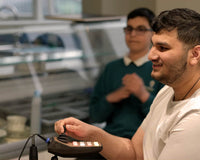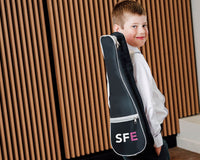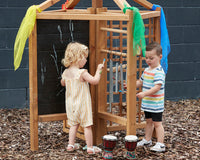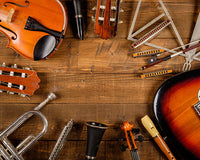
Percussion is an instrument that is either struck or scraped using hands and beaters etc. Percussion is split between two styles, tuned percussion which usually has a skin that can be tightened or loosened to create an identified pitch and un-tuned percussion which is a raw sound when struck. Here is a list of an example of percussion instruments: Drum Kits A drum kit is a mix of different size drums and cymbals. Generally made up of 5 pieces, they are often expanded and played by 1 person sat behind the kit. They are most common in bands and ensembles.
- Full Size Drum Kits
- Junior Drum Kits
- Electric Drum Kits
Orchestral Percussion Orchestral percussion is made up of a
varied amount of
instruments. Played in styles such as
concert bands and
classical music, a large part of being an orchestral percussionist is to get the
texture and
pitch of the instruments
perfect.
- Timpani
- Tubed Percussion
- Glockenspiels
- Xylophones
- Marimba
- Vibraphone
Marching Percussion Marching Percussion is designed to be played whilst
moving. They are
worn using
straps to
support them and tuned to a
high pitch for a
perfect clean tone. Marching percussionists are often referred to as the
battery.
- Snare Drum
- Bass Drum
- Tenor Drum
- Marching Cymbals
African Percussion African drums are made from raw materials and provide a spoken language in the Western Africa culture. It dates back to the 13th century and was used in African tribes proving a fast rhythm to communicate.
- Djembe
- Ghana Bell
- Balaphon
- Shekere
- Kalimba
- Caxixi
- Doum Doum
- Afuche
- Talking Drum
- Slit Drum
- Kpanlogo Drum
Caribbean Percussion Caribbean percussion is widely
adapted by
African and
European percussion. The most popular instrument
originated in Trinidad and Tobago is the
Steel Pan.
Indian and Middle East Percussion Indian and Middle East Percussion are
referred to as the category
membranophone. A lot of the percussion is
hand played and is known to be one of the most
rhythmic forms of drumming.
- Tabla Drums
- Dholak
- Tibetan Singing Bowl
- Doumbek
- Bhangra
- Mridangam
- Ghatam
- Kanjira
Irish Percussion Irish percussion, sometimes referred to as
Celtic percussion, is mostly known for its
Bodhran Drum.
- Bodhran Drum
- Celtic Bones
- The Spoons
Latin Percussion Latin Percussion is part of the
wide range of musical
styles used in
Latin Music. It is
influenced by African
tribal music. It is well known for its very
energetic and
creative styles.
- Congas
- Timbales
- Bongos
- Cajon
- Guiro
Samba Percussion Samba percussion is
loud and consists of a lot of
drums and
smaller percussion instruments. Another percussion instrument that is designed for
walking, they are popular in
large carnivals attracting lots of
listeners.
- Surdo
- Caixa
- Repinique
- Tamborim
- Ganza
- Agogo
- Reco-Reco
- Chocalho de Platinela
Hand Held Percussion Hand Held percussion is extremely
popular amongst
schools and
group work. They are instruments that are specifically
designed to be played by either
shaking or striking them and small enough to
hold.
- Bells
- Castanets
- Chime Bars
- Triangles
- Claves
- Tambourines
- Woodblocks
- Percussion Sound Effects
- Cymbals
- Tambourines
If you need any more information on the percussion then please feel free to contact me and I will be happy to help and answer any queries you have. You can get to me on 01283 535 333 or email to sales@normans.co.uk.





















